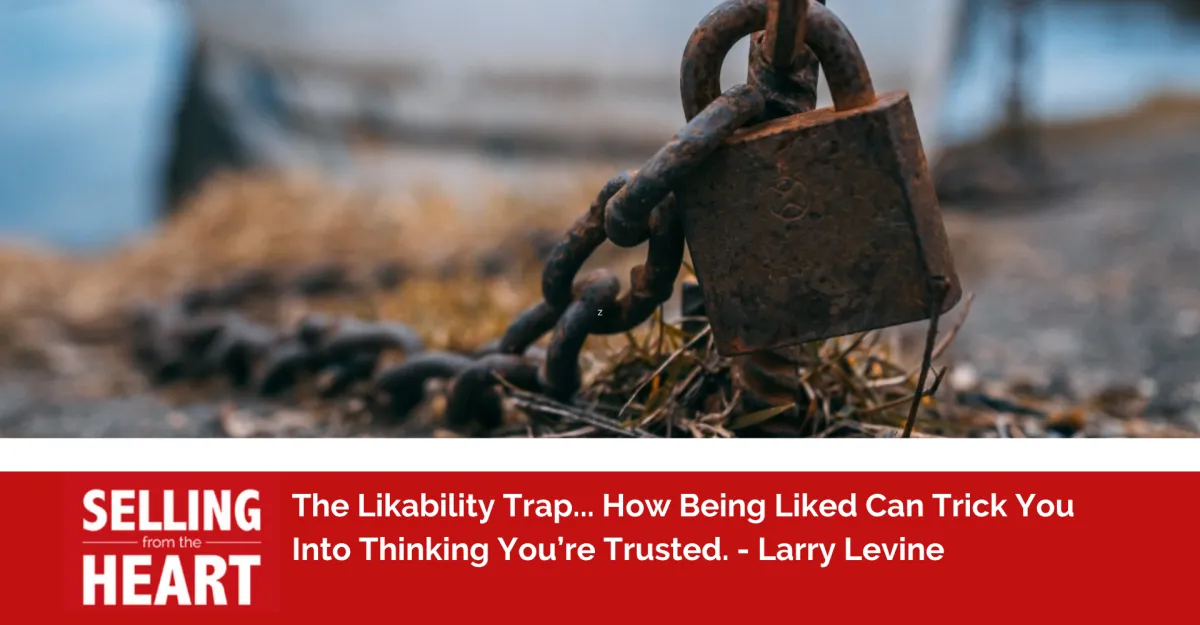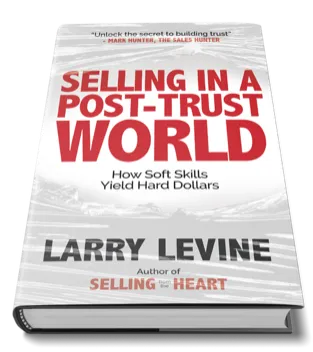
The Likability Trap: Why Being Liked Doesn’t Mean You’re Trusted in Sales
"Worry about being respected, never worry about being liked because that's the trap."
Jada Pinkett-Smith
For all those highly relational sellers, the trap many of you fall into is what I refer to as the Business Friendship Zone.
These type of sellers genuinely care about their clients, but they often prioritize being liked which often leads to:
Avoidance of truth, as they may withhold necessary, difficult truths or challenge a client's flawed strategy because they fear making the client uncomfortable or risking the relationship.
Lack of urgency, as they hesitate to push the sales process forward, assuming the client will move when they are ready, instead of creating purpose-driven urgency required to solve the client's problem.
Loss of authority, as they become a friendly listener or a vendor, rather than a trusted advisor. The client enjoys the conversation but doesn't feel compelled to invest, because the seller hasn't demonstrated the authority to guide them.
Do I have you thinking a bit? Now, we'll breakdown the above-mentioned quote and apply it to the sales community.
“Worry about being respected…”,
Respect is built on trust and truth.
Buyers, those being your clients, crave authentic, trustworthy professionals, not people who are just agreeable.
Respect in sales comes when you consistently show up with authentic relationships, meaningful value, inspirational experiences, and disciplined habits, the four pillars of the Trust Formula.
You earn respect by doing what’s right for the client, even when it’s hard. That means having the courage to challenge, to be transparent, and to offer insights that truly help, not just what they want to hear.
“…never worry about being liked…”
Likability is fleeting; credibility endures.
Many relational sellers fall into the approval trap, trying to be liked instead of trusted.
Success begins with who you are, not just what you do. When you’re genuine, some people may not like your honesty, but they will respect your integrity.
Being liked might get you a meeting. Being respected gets you the deal and the long-term relationship.
The trap is people-pleasing over purpose.
When salespeople chase approval, they compromise authenticity. They dilute their value, avoid tough conversations, and lose credibility.
This is all about...
Leading with clarity and conviction, not with the desire to be liked.
Building trust through honesty, not flattery.
Seeking to be valued, not validated.
By prioritizing respect, this ensures kindness is backed by competence.
Become the professional the client trusts to solve their problem, which is the foundational key to any successful, long-term sales relationship.
Likability versus building trust.
Salespeople love being liked. It makes them feel good when a client smiles, laughs at their jokes, or says, You’re one of the good ones. Here’s the uncomfortable truth, being liked is not the same as being trusted.
It’s one of the most subtle mind tricks in sales and one that convinces even experienced salespeople that they have solid relationships when, in reality, they have little more than surface-level rapport.
If you’ve ever lost a deal you had in the bag, or been blindsided by a loyal client who suddenly went elsewhere, this message is for you.
The Psychology Behind the Likability Illusion
You can’t build real relationships on surface-level charm. Likability opens the door, but authenticity invites people to stay.
Human beings are hardwired for belonging. Our brains reward connection or at least the appearance of it.
When someone smiles, mirrors our tone, or agrees with us, our neural circuits light up with dopamine, the same chemical surge we get from comfort food or affirmation.
It's in those moments, our nervous system whispers, You’re safe here.
However, in sales, that illusion of safety can be deceptive. This likability loop can make salespeople mistake comfort for connection. They walk away thinking, they like me, they must trust me.
Likability is fleeting. It’s often born out of convenience, not conviction. It’s a reflection of what we do for someone, not who we are to them.
Likability says, I enjoy you. Trust says, I believe in you. One is social; the other is sacred.
I'm here to inform you that real trust can’t be hacked or hurried. It grows in the soil of consistency, credibility, and care. It's deeply rooted in the foundation of Authentic Relationships built on Meaningful Value, Inspirational Experience, and Disciplined Habits.
Trust isn’t a moment; it’s a pattern. It’s built every time you follow through, every time you show up when it’s inconvenient, and every time your words align with your actions.
When you rely on likability alone, you may win attention, but you rarely earn allegiance.
Authentic professionals don’t just strive to be liked; they strive to be trusted, respected, and remembered.
People don’t buy from empty suits. They buy from hearts they can feel and professionals they can count on.
I ask you to pause for a moment and ask yourself... Am I chasing the fleeting glow of being liked or am I cultivating the steady warmth of being trusted?
One fills your ego. The other fuels your legacy.
Why Likability Doesn’t Equal Loyalty
A client may like you and still shop your proposal. They may like you and still ghost you.
They may like you and still go silent after saying, Let’s reconnect next week.
It’s easy to misread likability as loyalty. But these two things live on different sides of the trust equation.
Being liked stirs emotion. Being trusted shapes decisions.
Likability opens the door, but trust determines what happens once you’re inside. Trust is what makes someone take a risk on you, advocate for you, and stay with you when competitors come knocking with similar promises.
Trust isn’t built by charm, it’s built by consistency, character, and care.
Trust forms when:
Your actions align with your words
Your follow-through matches your intentions
Your value is meaningful, not mechanical
Your presence feels real, not rehearsed
This is the heart of Authentic Relationships (AR), Meaningful Value (MV), Inspirational Experience (IE), and Disciplined Habits (DH), the entire Trust Formula that supports selling with integrity.
And here’s the uncomfortable truth... A client can like you without ever believing in you. But they will never believe in you without trusting you.
Likability is temporary while trust is transformational.
When you show up with intention, emotional intelligence, and genuine curiosity, not just to get the deal but to understand the person behind the need, you shift from being someone they enjoy, to someone they rely on.
Likability gets you remembered; trust gets you chosen.
How Likability Manipulates Your Mind
Likability feels good.
It soothes the ego as it creates the illusion of momentum.
Likability can quietly hijack your thinking. It whispers to you, don’t rock the boat. Don’t ask too much or don’t push too far.
Before you realize it, you start operating from emotional preservation rather than authentic leadership.
When you rely too heavily on being liked, you begin playing defense in your own mind.
You start to:
Avoid hard questions because you fear being seen as difficult
Delay asking for the next step because pushy feels dangerous
Interpret friendliness as progress, even when no progress is being made
This will get you thinking... What conversations have you avoided because you wanted to keep the peace rather than pursue the truth?
This is where the sales pipeline starts to deceive you. It looks full, feels active, and it seems encouraging.
However, lurking well beneath the surface, it’s filled with friendly ghosts, people who enjoy you but aren’t moving forward, aren’t advancing commitments, and aren’t anchored in trust.
This is the likability trap.
Your mind protects your ego by convincing you that rapport equals relationship and that relationship equals opportunity.
Likability activates emotion while trust activates movement. Movement activates decisions and decisions activate revenue.
Without movement, all you have is a pleasant exchange.
True growth happens when relationships and value creation align in meaningful, measurable ways. A good conversation is fine, but unless it connects to outcomes, impact, or forward progress for you and the client, it’s just noise.
Ask yourself these questions...
Where am I mistaking comfort for connection?
Where am I valuing likability over leadership?
Where am I avoiding truth under the disguise of rapport?
Where am I allowing emotional safety to override business clarity?
And perhaps the most important question to ask yourself...
What would happen to my pipeline if I replaced the pursuit of being liked with the pursuit of being trusted?
Trust is earned through courage, not courtesy. Trust is earned through transparency, not tiptoeing. Trust is earned through meaningful value, not pleasant small talk.
Likability is fragile while trust is durable.
Likability attracts and trust advances. Trust is what moves deals, shapes decisions, and creates long-term growth.
The more you honestly examine where likability is manipulating your mind, the more space you create to show up authentically, heart-first, value-forward, and rooted in truth.
The Trust Formula, Your Antidote to the Likability Trap
If you want to stop confusing likability with loyalty, you must intentionally build trust, a cornerstone of Selling from the Heart.
Let’s peel this back a bit for you...
Create Authentic Relationships by showing up as your real self, not your sales persona. Ask hard, brave and confident questions, while being curious.
Create Meaningful Value as you bring insights, not brochures. Help clients think differently about their challenges.
Create Inspirational Experience by making every interaction memorable, not mechanical. Elevate how you show up before, during, and after meetings.
Create Disciplined Habits as consistency builds credibility. Do what you say, when you say it, even in the small things.
When these four align, likability becomes a byproduct of authenticity, not a manipulative mask.
Self-Check, Are You Really Trusted?
Trust is rarely lost loudly, it fades quietly.
The absence of trust doesn’t always show up as conflict, it often shows up as politeness, cordial conversations, and comfortable relationships that never deepen.
I encourage you to ask yourself...
Do my clients call me for advice that doesn’t lead directly to a sale?
This is the truest signal of trust. When clients invite you into their world without expecting a sales pitch, it means they see you as part of their decision-making ecosystem, not just a vendor orbiting around transactions.
Have I earned genuine access to multiple decision-makers and influencers inside each one of my accounts?
Not introductions out of courtesy but earned access. Trust expands when your influence expands. When you’re only connected to one person, you’re not embedded; you’re exposed.
Do my clients proactively refer me without being asked?
A referral is trust expressed publicly. It’s someone saying, I stake my reputation on this person showing up well for you. You can’t manufacture that; you can only inspire it.
If you answered no to any of these… pause, don’t judge but reflect.
It may be a sign that your relationships are built more on comfort than on conviction. More on being liked than being leaned on. More on rapport than on relevance.
Becoming aware of all of this is the doorway to authenticity. It’s the pivot point where salespeople move from performance to presence.
You can’t fake authenticity and you can’t outsource the inner work, either.
Those salespeople who consistently grow their revenue, their influence, and their impact are the ones willing to:
Look inward before looking outward
Examine their habits, not just their outcomes
Build courage alongside competence
Trade convenience for consistency
Deepen your curiosity by asking yourself...
Where am I playing it safe?
Where am I showing up as a vendor instead of a valued partner?
Where am I holding back the truth because I fear losing the relationship?
Where do I need to grow so my clients can confidently grow with me?
Real trust is earned in the unseen places, in who you are when nobody is watching, and in how you show up when nobody is buying.
Inner work creates outer impact, every time.
Moving from Likable to Trustworthy
With massive amounts of discipline, I encourage to implement these steps.
Step 1 - Audit your relationships. Create a list your top 10 clients or prospects. Rate each one (1–5) on how well they:
Understand your value
Involve you in strategic discussions
Advocate for you when you’re not in the room
This clarity will reveal where you have depth and where you’re skating on the surface.
Step 2 - Trade comfort for confidence. The next time you’re in a client meeting, ask a bold question such as... What’s one thing we’re not talking about that could cost your business next quarter?
Courageous questions convert comfort into credibility.
Step 3 - Create a trust habit. Set a weekly discipline to follow up on every commitment you make, even the smallest ones. Every email, every callback, every calendar invite is an opportunity to prove reliability.
Trust isn’t built in the big moments; it’s built in the follow-through.
The Opportunity in the Mirror
Here's the good news, you can retrain your brain.
Being likable isn’t a bad thing, it’s simply incomplete. When you pair genuine likability with intentional trust-building, you become magnetic.
Your clients don’t just enjoy your presence; they rely on it. They don’t just remember your smile; they remember your substance.
When you sell from the heart, not from your need to be liked, you transcend transactions and step into transformation.
Clients don’t stay loyal to who they like; they stay loyal to who they trust.
You have a choice; you can either keep chasing approval or you can start earning trust. You can stay in the comfort of likability or step into the discomfort that leads to growth.
If you take nothing else from this message, please take this... Authenticity wins in the long run.
The sales world doesn’t need more polished professionals; it needs more genuine people who care deeply, show up consistently, and act with heart.
So, go ahead, smile, connect, and be likable. However, never let being liked stop you from being real.
Trust, not charm, create sales sustainability.
Originally published on Larry Levine's LinkedIn.




